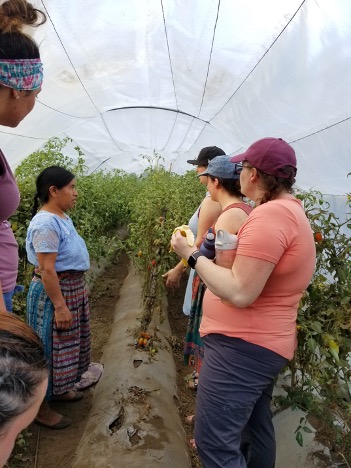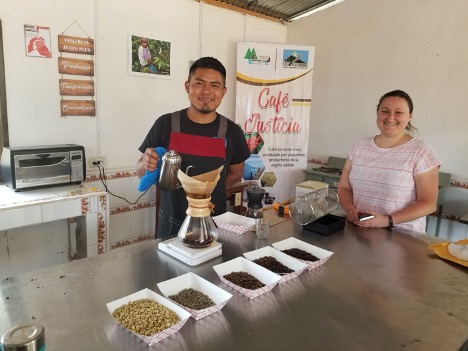In early March of 2020, PSAC young workers travelled to the Highlands of Guatemala to take part on the 13th Education-In-Action delegation, an annual project led by PSAC’s Social Justice Fund in collaboration with the solidarity organization Education In Action. Frédérique Conradi was part of the delegation. Here's her story.
During a recent PSAC Social Justice Fund/Education in Action delegation to Guatemala, we met with several Indigenous-led resistance movements that outlined the injustices facing Guatemalan workers. Official numbers indicate that over 40% of the population identifies as Indigenous but the number is likely higher. The commitment, strength, and determination of the community organizers we met were inspiring as they face many challenges locally and internationally. It was inspiring to witness who the PSAC stands in solidarity with and to learn from the actions they have taken to fight back. We were first introduced to the injustices faced by many Guatemalans with a testimony by Kimberly, a young 18-year-old woman who was one of 15 survivors of a government-run home fire, where 45 of her classmates perished. The problematic court system, and lack of interest and care for poor people’s experiences and lives was flagrant.
Land defenders
Land was at the core of many discussions. We first met with Festivales Solidarios, a grass-root organization advocating for the release of political prisoners, who are most often land defenders. Using  colourful imagery and engaged slogans, they have been able to mobilize support for their causes throughout Guatemala. We also met with the Xinka Parliament, the first Indigenous parliament in the country, that has been defending their land from Canadian mining interests for nearly 10 years through blockades and other efforts. Their land advocacy has been met with incredible amounts of violence by companies who call Canada their home. We also spent several days with the Comité Campesino Del Altiplano (CCDA), one of PSAC’s Social Justice Fund (SJF) main partners, who are advocating for the rights of Indigenous farmers to land and self-determination.
colourful imagery and engaged slogans, they have been able to mobilize support for their causes throughout Guatemala. We also met with the Xinka Parliament, the first Indigenous parliament in the country, that has been defending their land from Canadian mining interests for nearly 10 years through blockades and other efforts. Their land advocacy has been met with incredible amounts of violence by companies who call Canada their home. We also spent several days with the Comité Campesino Del Altiplano (CCDA), one of PSAC’s Social Justice Fund (SJF) main partners, who are advocating for the rights of Indigenous farmers to land and self-determination.
Land was always of issue. The land in Guatemala is controlled by corporations that seek profit over sustainability, health, and security. Guatemala has the highest concentration of land ownership in the world, where 2.5 % of the large landowners control two-thirds of the richest agricultural land, while small farmers, the majority Indigenous, have to eke out an existence on less than one-sixth of the land, most of it concentrated in Indigenous villages whose inhabitants often suffer from malnutrition. This is due, in large part, to the fact that large corporate agricultural industries own much of the land.
Food Sovereignty Initiatives
What stood out to me throughout this delegation was the resilience and creativity displayed by the Indigenous groups in their fight. Food sovereignty initiatives were part of the resiliency efforts we got to discover. Food sovereignty, or “the right of people to determine their own food and agricultural systems and their right to produce and consume healthy and culturally appropriate food” *(Via Campesina, 2020, pp.15) is a radical way to counteract the larger agricultural systems that persecute many and lead to food insecurity.
Several CCDA’s programs such as the women-led initiatives of a fish farm, medicinal garden, and greenhouses built at the participants’ homes, paired with opportunities for feminist education have empowered women and secured their place in the labour force while respecting the land and culture. Additionally, the coffee project, Café Justicia, trains farmers in organic farming. The coffee initiative also pays workers 15% higher wages than most other companies while offering training and support on sustainable approaches such as vermicomposting. This allows for better ownership of the land for Indigenous farmers.
 The Institute of Mesoamerican Permaculture (IMAP) that we had the privilege of visiting also contributes to these efforts by providing producers with techniques on the harvesting of traditional plants, and by seed saving so that native seeds don’t get lost or replaced by ones who rely on chemical fertilizers, pesticides and other costly products that also ruin the soil. As 80% of the land in San Lucas Tolimán is occupied with coffee, farmers do not grow their own food and rely on imports. IMAP advocates and provides training, so people know how to grow their own food in small spaces using sustainable practices, ancestral Mayan knowledge, and new technologies. These organizations attempt to take back control of the land and what is grown on it in line with the cultural beliefs of the region as well as the health of the land and everyone on it. The access to land and the ability to grow nutritious and culturally appropriate food is known as food sovereignty.
The Institute of Mesoamerican Permaculture (IMAP) that we had the privilege of visiting also contributes to these efforts by providing producers with techniques on the harvesting of traditional plants, and by seed saving so that native seeds don’t get lost or replaced by ones who rely on chemical fertilizers, pesticides and other costly products that also ruin the soil. As 80% of the land in San Lucas Tolimán is occupied with coffee, farmers do not grow their own food and rely on imports. IMAP advocates and provides training, so people know how to grow their own food in small spaces using sustainable practices, ancestral Mayan knowledge, and new technologies. These organizations attempt to take back control of the land and what is grown on it in line with the cultural beliefs of the region as well as the health of the land and everyone on it. The access to land and the ability to grow nutritious and culturally appropriate food is known as food sovereignty.
Solidarity with Guatemalans
Although their resilience is admirable, we should hope for a world where Indigenous communities do not have to struggle against profit-seeking companies. Nutrition and food are rights and should not be considered commodities. We can also have an impact on their fight for land rights. Many of the foods we buy in Canada can be traced to poor labour practices in Guatemala, at home, and around the world. By doing research on the foods we buy and supporting grassroots projects and organizations like the ones we do with the PSAC SJF we can also help reduce injustices. The delegation to Guatemala was an eye-opener that made clear the impact multinational corporations have on the land as well the important effects of food sovereignty initiatives here and abroad.
by Frédérique Conradi
Frédérique is a member of the Yukon Employees Union (YEU), Local Y018 where she has been involved in her local, most recently as Shop Steward. She also serves as Young Workers’ Director on the YEU Executive.
*Via Campesina. (2020). The solution to food insecurity is food sovereignty.
 Member Login
Member Login


